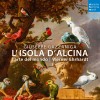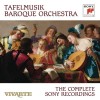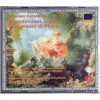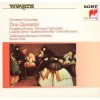Composers
Giuseppe Gazzaniga (October 5, 1743 – February 1, 1818) was a member of the Neapolitan school of opera composers. He composed fifty-one operas and is considered to be one of the last Italian opera buffa composers.
Born in Verona, Gazzaniga was initially intended for the priesthood at the urging of his devout parents. He eventually convinced his father to allow him to pursue a career in music and began studies first in Venice and then at the Conservatorio di Sant'Onofrio a Porta Capuana in Naples. While there, he was a pupil of Niccolò Piccinni and Nicola Porpora. Gazzaniga presented his first opera, il Barone di Trocchia, at the Teatro di San Carlo in 1768. He would spend the next several decades writing mostly operas in Italy with the exception of a few trips to Dresden, Vienna, and Prague. His most successful opera was his Don Giovanni Tenorio written in 1787 to a libretto by Giovanni Bertati, possibly an inspiration for the libretto of Mozart's Don Giovanni. His last opera, Martino Carbonaro o sia Gli sposi fuggitivi, was performed at the Teatro San Moisè in Venice in 1801.[1] He also wrote a symphony and three piano concertos.[2]
In 1791, he became musical director of Crema Cathedral in the Lombardy region of northern Italy, where he composed numerous sacred works including several cantatas, oratorios, and masses. He remained in that position until his death in 1818.[3] His life and works were the subject of a detailed study by the prominent 19th-century German critic Karl Chrysander.[
Recently Added
Biography
Giuseppe Gazzaniga (October 5, 1743 – February 1, 1818) was a member of the Neapolitan school of opera composers. He composed fifty-one operas and is considered to be one of the last Italian opera buffa composers.
Born in Verona, Gazzaniga was initially intended for the priesthood at the urging of his devout parents. He eventually convinced his father to allow him to pursue a career in music and began studies first in Venice and then at the Conservatorio di Sant'Onofrio a Porta Capuana in Naples. While there, he was a pupil of Niccolò Piccinni and Nicola Porpora. Gazzaniga presented his first opera, il Barone di Trocchia, at the Teatro di San Carlo in 1768. He would spend the next several decades writing mostly operas in Italy with the exception of a few trips to Dresden, Vienna, and Prague. His most successful opera was his Don Giovanni Tenorio written in 1787 to a libretto by Giovanni Bertati, possibly an inspiration for the libretto of Mozart's Don Giovanni. His last opera, Martino Carbonaro o sia Gli sposi fuggitivi, was performed at the Teatro San Moisè in Venice in 1801.[1] He also wrote a symphony and three piano concertos.[2]
In 1791, he became musical director of Crema Cathedral in the Lombardy region of northern Italy, where he composed numerous sacred works including several cantatas, oratorios, and masses. He remained in that position until his death in 1818.[3] His life and works were the subject of a detailed study by the prominent 19th-century German critic Karl Chrysander.[






